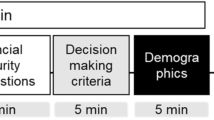Abstract
This article addresses five research questions: What specific behaviors are described in the literature as ethical or unethical? What percentage of business people are believed to be guilty of unethical behavior? What specific unethical behaviors have been observed by bank employees? How serious are the behaviors? Are experiences and attitudes affected by demographics? Conclusions suggest: There are seventeen categories of behavior, and that they are heavily skewed toward internal behaviors. Younger employees have a higher level of ethical consciousness than older employees. The longer one works for a company, the more one may look to job security as a priority; this can lead to rationalizing or overlooking apparently unethical behaviors. More emphasis is needed on internal behaviors with particular attention on the impact that external behaviors have on internal behaviors.
Similar content being viewed by others
References
Adizes, I. and Weston, J. F.: 1973, ‘Comparative Models of Social Responsibility’,Academy of Management Journal 16, pp. 112–127.
Berenson, C.: 1972, ‘The Product Liability Revolution’,Business Horizons 15, pp. 71–80.
Burke, K.: 1969,A Grammar of Motives (University of California Press, Berkeley, Calif.).
Cavanagh, G. F., Moberg, D. J. and Velasquez, M.: 1981, ‘The Ethics of Organizational Politics’,Academy of Management Review 6, pp. 363–374.
Clement, R. W., Pinto, P. R., and Walker, J. W.: 1978, ‘Unethical and Improper Behavior by Training and Development Professionals’,Training and Development Journal, pp. 10–12.
Clifford, N.: 1986, ‘Who Was Minding the Shop?’,Forbes (March 10), pp. 65–72.
Crock, S. and Jaben, J.: October 7, 1985, ‘Washington Turns up the Heat on Banking A La Bert Lance’,Business Week, pp. 78–79.
Dozier, J. B. and Miceli, M. P.: 1988, ‘Potential Predictors of Whistle-Blowing: A Prosocial Behavior Perspective’,Academy of Management Review 10, pp. 823–836.
Frank, A. D.: October 6, 1986, ‘See No Evil’,Forbes, pp. 38–41.
Jansen, E. and Von Glinow, M. A.: 1985, ‘Ethical Ambivalence and Organizational Reward Systems’,Academy of Management Review 10, pp. 814–822.
Magnet, M.: December 8, 1986, ‘The Decline and Fall of Business Ethics’,Fortune, pp. 65–72.
Mihalek, P. H., Rich, A. J., and Smith, C. S.: 1987, ‘Ethics and Management Accountants’,Management Accounting, pp. 34–36.
Nadar, R., Petkas, P., and Blackwell, K.: 1972,Whistle blowing (Grossman, NY).
Pastin, M. and Hooker, M.: 1980, ‘Ethics and the Foreign Corrupt Practices Act’,Business Horizons 23, pp. 43–47.
Shanklin, W. L.: 1976, ‘Corporate Social Responsibility: Another View’,Journal of Business Research 4, pp. 75–84.
Singer, C.: 1987, ‘The Political Morality of Lending to Nonfriendly Nations’,The Bankers Magazine, pp. 20–24.
Snoeyenbos, M., Almeder, R. and Humber, J.: 1983,Business Ethics (Prometheus, New York).
Stevens, G. E.: 1984, ‘Business Ethics and Social Responsibility: The Responses of Present and Future Managers’,Akron Business and Economic Review, pp. 6–11.
Vandevier, K.: 1978, ‘The Aircraft Brake Scandal: A Cautionary Tale in Which the Moral is Unpleasant’, in A. G. Athos and J. J. Babarro (eds.)Interpersonal Behavior: Communication and Understanding Relationships (Prentice-Hall, Englewood Cliffs, NJ).
Walton, C.: 1967,Corporate Social Responsibilities (Wadsworth, Belmont, Calif.).
Zenisek, T. J.: 1979, ‘Corporate Social Responsibility: A Conceptualization Based on Organizational Literature’,Academy of Management Review 4, pp. 359–368.
Author information
Authors and Affiliations
Additional information
William J. Mitchell is a Ph.D. student in public administration.
Phillip V. Lewis is the Duniven Professor of Management at Abilene Christian University. Dr. Lewis' most recent book isOrganizational Communication: The Essence of Effective Management (Wiley, 1987). He is the author of ‘Defining Business Ethics: Like Nailing Jello to A Wall’ (Journal of Business Ethics, October 1985) and ‘Ethical Principles for Decision Makers: A Longitudinal Survey’ (Journal of Business Ethics, August 1989).
N. L. Reinsch, Jr. is Chairman, Department of Management Sciences, Abilene Christian University. Dr. Reinsch is co-author ofCommunication in Interviews (Prentice-Hall, 1982) and ‘Voice Mail vs. Conventional Channels’ (Academy of Management Journal, December 1990).
Rights and permissions
About this article
Cite this article
Mitchell, W.J., Lewis, P.V. & Reinsch, N.L. Bank ethics: An exploratory study of ethical behaviors and perceptions in small, local banks. J Bus Ethics 11, 197–205 (1992). https://doi.org/10.1007/BF00871967
Issue Date:
DOI: https://doi.org/10.1007/BF00871967



